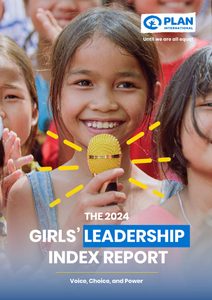The 2024 Girls’ Leadership Index Report
The 2024 Girls' Leadership Index offers a critical examination of the progress and challenges facing girls and young women across the Asia-Pacific region.

In March 2020, Plan International Asia-Pacific (APAC) Regional Hub invested in girls’ leadership in Asia and the Pacific and launched the first Asia Girls Report that presented the Asia Girls’ Leadership Index, followed by the launch of the Pacific Girls’ Leadership Index in 2021 and 2022. Using available data from globally recognised databases, the Girls’ Leadership Indexes (GLI) measure the opportunities of adolescent girls and young women in 19 South and Southeast Asian countries and 14 Pacific Island member countries and territories of the Economic and Social Commission for Asia and the Pacific (ESCAP) to develop and demonstrate leadership capabilities.
For the purpose of the GLIs, girls’ leadership has been defined as “the ability of girls and young women to make decisions by themselves and exercise their rights at different levels and in different aspects of their lives, and their ability to individually and collectively influence decision-making and decision-makers about issues that affect their ability to realise their rights.”
Why we need the Girls Leadership Index
Girls’ leadership continues to face significant barriers across the Asia-Pacific region. These barriers include limited access to quality education, economic opportunities, and participation in decision-making processes. Cultural norms, gender-based violence, and early marriage remain systemic challenges, particularly in lower-ranking countries. Additionally, a lack of disaggregated data on girls’ leadership in key areas hampers effective policymaking and programme development. The scarcity of gender-specific and age-specific data across sectors, particularly in adolescent health and economic participation, highlights the need for a comprehensive and continuous data collection process.
The GLI provides critical insights into the progress and gaps in advancing girls’ leadership across the Asia-Pacific region. It offers a measurable framework that helps governments, development organisations, and private sector stakeholders identify areas for targeted interventions to empower girls and young women and ensure their full participation and leadership in society.
Girls’ Leadership Index Report 2024
The GLIs comprise 7 core domains: education, economic opportunities, protection, health, political voice and representation, national laws and policies, and climate action. Each domain is an aggregation of between 3 and 5 indicators drawn from internationally recognised databases available online. A normalisation process is required before aggregating indicators for each domain to account for indicators having different measurement units. Domain indexes are obtained by averaging the normalised positive indicators within the domain, with the resulting index lying in the range [0,1]. The higher the score, the more advanced the country is in this domain in terms of girls’ leadership. The GLI is then obtained by averaging the seven domain indexes.
This report presents newly available data across seven Asian and Pacific GLI 2024 core domains. The report is organised as follows:
● Section 1: Brief Overview of the Girls’ Leadership Index
● Section 2: Scope of the GLI and methodology for index development
● Section 3: The updated Girls’ Leadership Index 2024, including trend analysis and comparison against the 2022 index, as well as highlighting significant changes that inform development needs
● Section 4: Recommendations based on the GLI 2024 that help readers identify focused areas for intervention and actionable points for practitioners and policymakers
The 2024 Girls Leadership Index Report
3 mb
Categories: About Plan International, Youth empowerment


